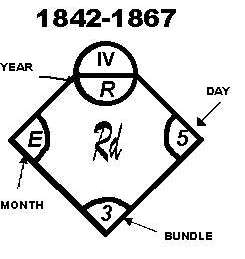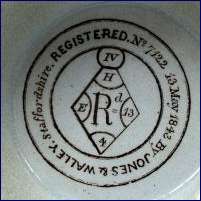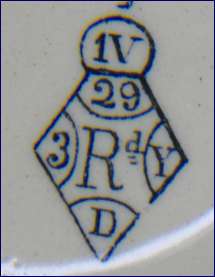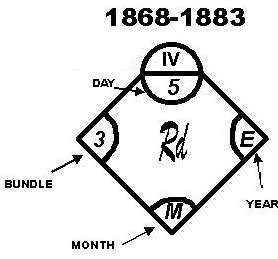| British Pottery Registration Diamonds & Numbers |
| A guide to understanding the basics of the registration diamond marks and numbers on the underside of pottery. |
 |
During
the period 1842-1883 the British Patent Office issued a diamond mark along
with the registration number when a design was registered.
As well as showing that the design had been registered, diamond mark offered the buyer the reassurance of knowing an item was of British design. It also assured the person registering the design a degree of protection from copying. The protection was dependent on the type of material and the class in which the product was placed. The mark was created to identify the type of material used (known as the
class), how many items were included, (sometimes known as bundles or
packages, and the date of registration. The centre is occupied by the abbreviation Rd signifying that this is a Patent Office mark standing for Registered Design |
1) What 'class' is the material?
 The
Roman numeral at the top of the diamond indicated the 'class' or
type of material used - for example III was for glass ware and IV
was for clay ware. The
Roman numeral at the top of the diamond indicated the 'class' or
type of material used - for example III was for glass ware and IV
was for clay ware. |
2) What year range is the mark from?
There are two ranges of year codes; 1842-1867 & 1868-1883. At first glance they look the same but if you look closely you can see that some have a number at the right hand corner and some have a letter.
3) Understanding marks 1842-1867
First of all make sure there is a number in the right hand corner as shown below:-
[Note; If there is a letter then the mark is 1868-1883]
You can ignore the number at the bottom of the diamond - this tells us how many items were included in the registration, (sometimes known as bundles or packages).
The parcel number does not indicate any number of items. It just shows that more than one application for design registration was made on that day. Hence “parcel” 1 may be registered by one applicant on a particular date, parcel 2 by another, parcel 3 by yet another etc. It would presumably have been used within the design registry to file away the documents relevant to each registration.From the other numbers and letters we can work out the date of the registration:
Day - Right hand corner - this is self explanatory
Month - Left hand corner - this is worked out from the code below:-
Month letter Month Month letter Month A December H April B October I July C January K November D September M June E May R August G February W March
Year - Top of the diamond - this is worked out from the code below (they are listed in alphabetical order):-
Year codes for 1842 - 1867
Year codes Year codes Year codes A 1845 J 1854 S 1849 B 1858 K 1857 T 1867 C 1844 L 1856 U 1848 D 1852 M 1859 V 1850 E 1855 N 1864 W 1865 F 1847 O 1862 X 1842 G 1863 P 1851 Y 1853 H 1843 Q 1866 Z 1860 I 1846 R 1861 Exception Notes:
In 1857 the letter R was used during 1-19 September, and during 1860 the letter K was used for December.
registration date for this mark:
27th April (H) 1847 (F)
just to prove it works.....!
Jones & Walley put both the date and
the registration diamond to give the following:-
13th May (E) 1843 (H)
4) Understanding marks 1868-1883
First of all make sure there is a letter in the right hand corner as shown below:-
If there is a number then the mark is 1842-1867
You can ignore the number at the left hand corner of the diamond - this tells us how many items were included in the registration, (sometimes known as bundles or packages).
From the other numbers and letters we can work out the date of the registration.Day - Top of the diamond - this is self explanatory
Month - Bottom of the diamond - this is worked out from the code below:-
Month letter Month Month letter Month A December H April B October I July C January K November D September M June E May R August G February W March
Year - Right hand corner of the diamond - this is worked out from the code below (they are listed in alphabetical order):-
Year codes for 1868 - 1883
Year codes Year codes A 1871 L 1882 C 1870 P 1877 D 1878 S 1875 E 1881 U 1874 F 1873 V 1876 H 1869 X 1868 I 1872 Y 1879 J 1880 K 1883
Exception notes:
From 1-6 March 1878, W was used for the year in place of D; and G was used for the month in place of W.
registration date for this mark:
29th September (D) 1879 (Y)
5) This year table is in chronological order -to help in identifying possible exceptions as shown below:
1842 - 1867 and 1868 - 1883
Year codes Year codes Year codes Year codes 1842 X 1855 E 1868 X 1881 E 1843 H 1856 L 1869 H 1882 L 1844 C 1857 K 1870 C 1883 K 1845 A 1858 B 1871 A 1846 I 1859 M 1872 I 1847 F 1860 Z 1873 F 1848 U 1861 R 1874 U 1849 S 1862 O 1875 S 1850 V 1863 G 1876 V 1851 P 1864 N 1877 P 1852 D 1865 W 1878 D 1853 Y 1866 Q 1879 Y 1854 J 1867 T 1880 J
Exception Notes:
In 1857 the letter R was used during 1-19 September, and during 1860 the letter K was used for December. From 1-6 March 1878, W was used for the year in place of D; and G was used for the month in place of W.
REGISTERED NUMBERS - from 1884
| Registered numbers are a
consecutive numbering system which started in 1884 of designs which were
registered by companies.
The Registered Number, usually written as Rd on the piece of pottery, gives the date when that design was registered to prevent copying, but it could have been made at any time later than that date. |
The table below gives the year and the registration numbers issued during that year
- for example any Rd number from 19756 to 40479 was issued in 18851884 1
1885 19756
1886 40480
1887 64520
1888 90483
1889 116648
1890 141273
1891 163767
1892 185713
1893 205240
1894 224720
1895 246975
1896 268392
1897 291241
1898 311658
1899 331707
1900 351202
1901 368154
1902 385180
1903 403200
1904 424400
1905 447800
1906 471860
1907 493900
1908 518640
1909 535170
1910 552000
1911 574817
1912 594195
1913 612431
1914 630190
1915 644935
1916 653521
1917 658988
1918 662872
1919 666128
1920 673750
1921 680147
1922 687144
1923 694999
1924 702671
1925 710165
1926 718057
1927 726330
1928 734370
1929 742725
1930 751160
1931 760583
1932 769670
1933 779292
1934 789019
1935 799097
1936 808794
1937 817293
1938 825231
1939 832610
1940 837520
1941 838590
1942 839230
1943 839980
1944 841040
1945 842670
1946 845550
1947 849730
1948 853260
1949 856999
1950 860854
1951 863970
1952 866280
1953 869300
1954 872531
1955 876067
1956 879282
1957 882949
1958 887079
1959 891665
1960 895000
1961 899914
1962 904638
1963 909364
1964 914536
1965 919607
![]() Details of the registrations are held at: -
Details of the registrations are held at: -
|
![]()
Back to Pottery - Ceramic Trade Marks




